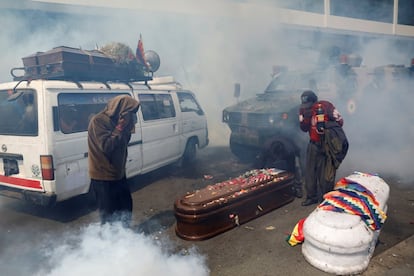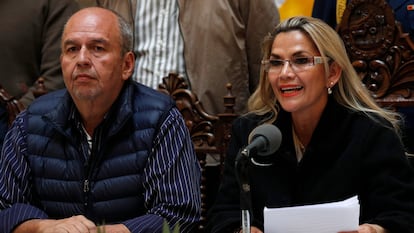Bolivian prosecutors seek 30 years for former president Jeanine Áñez over 2019 Sacaba and Senkata massacres
The ex-leader of Bolivia, who is already serving another sentence for the overthrow of Evo Morales, will be tried as an ordinary citizen

Bolivian prosecutors have formally charged former president Jeanine Áñez, three of her ministers and dozens of military chiefs, including former commanders of the three branches of the Armed Forces, over the Sacaba and Senkata massacres, and have requested the maximum sentence of 30 years in prison for her and all the other defendants. These massacres, in which 20 people died, occurred in the regions of Cochabamba and La Paz in November 2019, during the interim government that Áñez led after the overthrow of Evo Morales.
The Attorney General, Juan Lanchipa, stated at a press conference that Áñez ordered the military and police repression of the protests against her government in breach of “the principles of necessity, proportionality, discrimination, and rationality” that state actions must follow in the face of a threat to public order. The accusation states that “weapons and munitions of war, armored mechanized vehicles, as well as helicopters and airplanes were used against unarmed civilian demonstrators.” Lanchipa explained that the prosecution has evidence that Áñez was in contact with the military and police command at the time of the operations, and therefore presumes that she was in control of them. Government ministers Arturo Murillo, Luis Fernando López and Víctor Hugo Zamora, as well as the military officers in charge of the repression, also face the same charges. Under Bolivian judicial terminology, this charge is that of “genocide,” which is equivalent to “massacre” and is punishable with the maximum penalty allowed by the country’s legal system.
Áñez, who is already in prison over another case, posted on a social network that she stands accused of genocide as if she were “Hitler, Hamas, or the dictatorships they applaud. Genocide is killing people with hunger and drugs, mercury poisoning or fires, fencing cities, prohibiting the passage of oxygen and food.” She also pointed out that “there is not and there will not be justice without a trial of responsibilities, without Evo Morales before the corresponding court, which will determine the truth. The revenge of the MAS [Movement for Socialism, the ruling party of which Morales is leader] is pure dictatorship.”
The accusation against Áñez is being processed as an ordinary trial, that is to say, it does not respect her right to a so-called “trial of responsibilities” in the Supreme Court of Justice (TSJ), as a former president of the country and with the authorization of two-thirds of the Senate. For this reason, Áñez has decided not to testify before the commission of prosecutors that prepared the indictment and will instead present her case before international judicial bodies. According to Attorney General Lanchipa, the choice of the ordinary procedure is justified because Áñez did not follow the “thread of constitutional succession” upon assuming power. Another former minister under Áñez, Jerjes Justiniano, who is in exile in the United States, noted that, at the time, Lanchipa recognized Áñez as the legitimate president of Bolivia.

Áñez, who was then the second vice-president of the Senate, took over in a controversial manner after the resignation of Morales and his natural successors in November 2019. She governed until the November 2020 elections, which were won by Bolivia’s current president, Luis Arce. According to the Constitution, the prosecution of former presidents for crimes committed during the performing of their duties must be carried out according to a special protocol, before the highest court, and authorized by a two-thirds majority of members of the Legislative Assembly. Since the accusing party, MAS, lacks such a majority, it has circumvented this obstacle in two ways: first, it accused Áñez of crimes committed prior to her inauguration as president, in a case known as “Coup II,” which resulted in the conviction of the former president to 10 years in prison, which she is currently serving. And, secondly, MAS made use of the authorization that the TSJ gave at the beginning of the year to prosecute Áñez as an ordinary citizen even for events that took place during her administration, after a judge accepted a lawsuit from the victims of the massacres. The judge based his decision on the fact that the accused did not have “presidential credentials” and, therefore, in his view, could not be legally considered as such.
Áñez’s defense considers the proceedings to be illegal and notes that even Luis García Meza, the former military dictator convicted of human rights violations in Bolivia in 1993, was afforded a trial of responsibilities. They are also confident that, at some point, international bodies will demand that the Bolivian state annul all proceedings against the former president.
In April, Minister of Justice Iván Lima justified the TSJ’s authorization to pursue an ordinary prosecution. “Faced with the imposture and hypocritical attitude of [parliamentary opposition leaders] Carlos Mesa and Luis Fernando Camacho in telling the media that a two-thirds majority was going to provide congressional authorization [for the trial], which they have not done during all this time and have been systematically blocking, we had no choice but to seek justice for the victims [in an ordinary trial],” he stated.
On November 15, 2019, in Sacaba, a town near Cochabamba, a column of coca growers trying to reach the latter city was stopped by a combined police and army force. Ten farmers were killed and dozens were shot and wounded. The government claimed that they were armed and had shot at each other. On November 19, joint forces temporarily broke the neighborhood blockade of the Senkata gas and gasoline storage plant in El Alto, to deliver tanker trucks carrying gasoline to the neighboring city of La Paz, which lacked fuel. In response, the protesters tore down the plant’s outer wall. Ten residents were killed by gunfire. The government at the time accused them of attempting to blow up the facility. Áñez declared shortly afterwards that “the lives of more than 250,000 Alteños were put at risk... The tragedy would have reached devastating dimensions.”
In August 2021, the Interdisciplinary Group of Independent Experts of the Inter-American Commission on Human Rights — invited to Bolivia to evaluate the 2019 crisis — qualified the events in Sacaba and Senkata as massacres, affirmed that there was never any risk that the Senkata plant would explode and established that during the repressive actions “extrajudicial executions” took place.
Sign up for our weekly newsletter to get more English-language news coverage from EL PAÍS USA Edition
Tu suscripción se está usando en otro dispositivo
¿Quieres añadir otro usuario a tu suscripción?
Si continúas leyendo en este dispositivo, no se podrá leer en el otro.
FlechaTu suscripción se está usando en otro dispositivo y solo puedes acceder a EL PAÍS desde un dispositivo a la vez.
Si quieres compartir tu cuenta, cambia tu suscripción a la modalidad Premium, así podrás añadir otro usuario. Cada uno accederá con su propia cuenta de email, lo que os permitirá personalizar vuestra experiencia en EL PAÍS.
¿Tienes una suscripción de empresa? Accede aquí para contratar más cuentas.
En el caso de no saber quién está usando tu cuenta, te recomendamos cambiar tu contraseña aquí.
Si decides continuar compartiendo tu cuenta, este mensaje se mostrará en tu dispositivo y en el de la otra persona que está usando tu cuenta de forma indefinida, afectando a tu experiencia de lectura. Puedes consultar aquí los términos y condiciones de la suscripción digital.








































